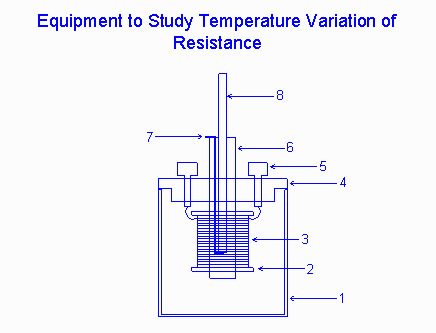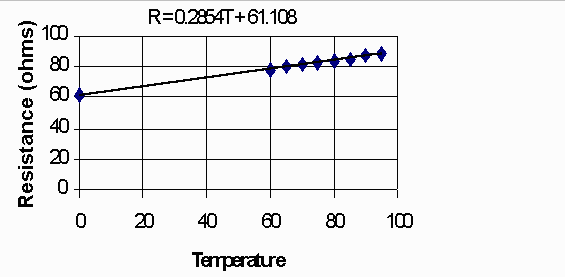P. J. Ouseph
Physics Department University of Louisville Louisville,
KY 40206
502 852 0918 Fax 502 852 0742
E-mail pjouse01@louisville.edu
Low Cost Apparatus
Apparatus Title: Temperature Variation of Resistance
Abstract: A copper coil (60 - 100 ohms) wound over a copper
tube is used to study the temperature variation of resistance. The coil
is placed in a can of water and connected to ac voltage line for 10 min.
The resistance of the coil is then measured with a multimeter as a function
of temperature.
Equipment required to construct apparatus:
Item Source/store part number Cost ($)
-
Soup can 0
-
#32 copper wire KY state surplus store 2.00
-
Copper tube Hardware store 1.00
-
Nylon cover MSC Industrial Supply Co. 6.61 (We bought a foot
long rod #63394258 for $ 36.64 to make six covers for six experimental
set-ups.)
-
Connecting wires and banana plugs Radioshack 5.00
-
Plexiglass pipe 2.00
-
Multimeter Pasco SE-9786 39.00
-
Thermometer Pasco SE-9084 6.00
-
Total cost 61.6 1 Sketch of the apparatus (see attached sheet)
Fig.1 Line drawing of the equipment to study temperature
variation of resistance.
Description Temperature Variation of Resistance
 The
experimental system, shown in Fig.1, consists of a soup can (1), a nylon
can cover (4), a resistance coil (3), and a thermometer (8). The resistance
coil is made by winding 4-m long #32 insulated copper wire over a copper
pipe (6) with a diameter of 1.6-cm and a length of 15 cm. The copper wire
is between two Plexiglass rings (2) glued to the copper pipe. The Plexiglass
rings are 3 mm wide and they are cut from a Plexiglass tube with 1.6 mm
inner diameter and 2.2 mm outer diameter. The copper coil has a resistance
of 80 ohms. It is found that the coil resistance of 60-100 ohms is most
suitable for this experiment. The ends of the coil are connected to banana
plug sockets (5) fixed to the nylon cover. The copper pipe is also fixed
to the nylon cover. A thermometer (8), inserted in the copper pipe, is
resting on a copper support (7) hanging from the top of the copper pipe.
The bottom of the thermometer is approximately at the center of the coil.
Procedures
The
experimental system, shown in Fig.1, consists of a soup can (1), a nylon
can cover (4), a resistance coil (3), and a thermometer (8). The resistance
coil is made by winding 4-m long #32 insulated copper wire over a copper
pipe (6) with a diameter of 1.6-cm and a length of 15 cm. The copper wire
is between two Plexiglass rings (2) glued to the copper pipe. The Plexiglass
rings are 3 mm wide and they are cut from a Plexiglass tube with 1.6 mm
inner diameter and 2.2 mm outer diameter. The copper coil has a resistance
of 80 ohms. It is found that the coil resistance of 60-100 ohms is most
suitable for this experiment. The ends of the coil are connected to banana
plug sockets (5) fixed to the nylon cover. The copper pipe is also fixed
to the nylon cover. A thermometer (8), inserted in the copper pipe, is
resting on a copper support (7) hanging from the top of the copper pipe.
The bottom of the thermometer is approximately at the center of the coil.
Procedures
-
1. Pour water into the can, sufficient to cover the coil,
but not touching the metallic ends of the sockets.
-
2. Connect the voltage line (110 V) to the coil for 10 min
to heat the water.
-
3. Disconnect ac and connect the multimenter to read resistance
of the coil.
-
4. Read resistance of the coil starting when the temperature
is 95 deg C till the temperature reaches 65 deg C, at 5 deg temperature
intervals. (It takes only 1 hr to complete the experiment.)
-
Note that the water and the coil cooled by radiation in air,
we did not disturb the system during data collection.
Results
Figure 2 shows the data obtained for a coil with a resistance
of 60 ohms at room temperature. Obviously the resistance of the coil varies
linearly with temperature and the temperature coefficient of resistance
obtained from the experiment, 4.5 x 10-3 1/K, is very close to the accepted
value.

Fig. 2 Resistance variation of a 60 ohm coil as a function
of temperature.
Comments
The equipment described here can be easily constructed
and the experiment can be performed in high school or college laboratories
with good results. We have also used this equipment successfully with PASCO
Science workshop 750 interface.
 The
experimental system, shown in Fig.1, consists of a soup can (1), a nylon
can cover (4), a resistance coil (3), and a thermometer (8). The resistance
coil is made by winding 4-m long #32 insulated copper wire over a copper
pipe (6) with a diameter of 1.6-cm and a length of 15 cm. The copper wire
is between two Plexiglass rings (2) glued to the copper pipe. The Plexiglass
rings are 3 mm wide and they are cut from a Plexiglass tube with 1.6 mm
inner diameter and 2.2 mm outer diameter. The copper coil has a resistance
of 80 ohms. It is found that the coil resistance of 60-100 ohms is most
suitable for this experiment. The ends of the coil are connected to banana
plug sockets (5) fixed to the nylon cover. The copper pipe is also fixed
to the nylon cover. A thermometer (8), inserted in the copper pipe, is
resting on a copper support (7) hanging from the top of the copper pipe.
The bottom of the thermometer is approximately at the center of the coil.
Procedures
The
experimental system, shown in Fig.1, consists of a soup can (1), a nylon
can cover (4), a resistance coil (3), and a thermometer (8). The resistance
coil is made by winding 4-m long #32 insulated copper wire over a copper
pipe (6) with a diameter of 1.6-cm and a length of 15 cm. The copper wire
is between two Plexiglass rings (2) glued to the copper pipe. The Plexiglass
rings are 3 mm wide and they are cut from a Plexiglass tube with 1.6 mm
inner diameter and 2.2 mm outer diameter. The copper coil has a resistance
of 80 ohms. It is found that the coil resistance of 60-100 ohms is most
suitable for this experiment. The ends of the coil are connected to banana
plug sockets (5) fixed to the nylon cover. The copper pipe is also fixed
to the nylon cover. A thermometer (8), inserted in the copper pipe, is
resting on a copper support (7) hanging from the top of the copper pipe.
The bottom of the thermometer is approximately at the center of the coil.
Procedures
